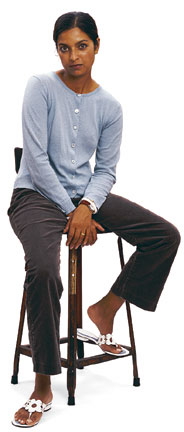 In
your first book, ''Interpreter
of Maladies,'' and your new book, ''The
Namesake,'' you write about Indian immigration and the difficulty
of assimilating into American culture. But Indian culture has
recently become very hip in the United States -- from films like
''Bend It Like Beckham'' to fashion to yoga. What do you make
of that?
In
your first book, ''Interpreter
of Maladies,'' and your new book, ''The
Namesake,'' you write about Indian immigration and the difficulty
of assimilating into American culture. But Indian culture has
recently become very hip in the United States -- from films like
''Bend It Like Beckham'' to fashion to yoga. What do you make
of that?
It's something that I don't like to think about. People have said,
''Oh, you only sold your book because Indian things are hot.''
They've said that to your face?
Sure. And there's generally a sense that I have advantages because
of the larger desire for diversity.
So do you ignore all these Indian imports? Do they appeal to you?
I've always been very ambivalent about things Indian. I don't
feel pride when I see this stuff happening -- I don't feel that
''we've made it.'' I don't feel part of any we. And it's funny.
Nobody I know in India practices yoga. You don't have people rushing
home from their jobs to make it to the 6 o'clock yoga class. And
I'm amused to see Indian clothing becoming popular -- I rebelled
against it as a kid because I wanted to wear jeans. So when I
see someone like Madonna sporting the Indian look, it's very ironic
to me. I grew up with people saying, ''What's that on your mom's
forehead?'' And not in a good way.
You made a spectacular debut with ''Interpreter of Maladies,''
winning the Pulitzer Prize. How much pressure did you feel writing
this novel?
When all of that happened, I felt more perplexed than happy. It
was so deeply unexpected and unanticipated. I don't regret it,
I don't think. But it was like being a kid and getting a senior
citizens' discount. I felt like I wasn't there yet as a writer.
In the new book, you explain that all Bengalis have private pet
names and public ''good names.'' But the main character in
''The Namesake'' is given only one name: Gogol, after the
Russian writer.
That happened to me. My name, Jhumpa, which is my only name now,
was supposed to be my pet name. My parents tried to enroll me
in school under my good name, but the teacher asked if they had
anything shorter. Even now, people in India ask why I'm publishing
under my pet name instead of a real name.
What does Jhumpa mean?
Jhumpa has no meaning. It always upset me. It's like jhuma, which
refers to the sound of a child's rattle, but with a ''p.'' In
this country, you'd never name your child Rattle. I actually have
two good names, Nilanjana and Sudeshna. My mother couldn't decide.
All three are on the birth certificate. I never knew how to write
my name.
You've said that despite living virtually all your life in the
States, you still find it hard to think of yourself as an American.
Why?
Mainly because my parents didn't think of themselves as American.
You inherit that idea of where you're from. So calling myself
an American would have been a betrayal. I continue to be hestitant
to call myself an American, but I also feel hesitant to call myself
anything else.
So you're not comfortable calling yourself an Indian, either?
No, no. My parents told me I was an Indian, but going to India
as a child made it apparent that I simply did not have a claim
to either country. In the eyes of Indians who never left, I'm
not an Indian at all.
You have a 15-month-old son. What expectations do you have for
him as a second-generation Indian-American?
Slash Guatemalan-Greek.
Sorry. How much more American can you get?
Exactly. I want him to respect his traditions and all traditions.
Your first book won the Pulitzer, and you and your family live
in a lovely home in New York. Aren't you living the American dream?
I've never thought that. I will say that the Pulitzer meant so
much more to my parents than it did to me. They were very proud.
They came here, they left a lot behind to make a better life.
And freaky things happen.
[Editor's
Note: Please see book review of The
Namesake on this very site.]